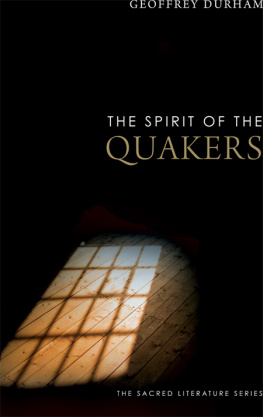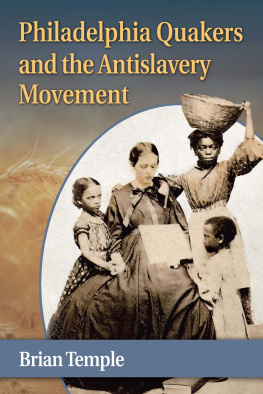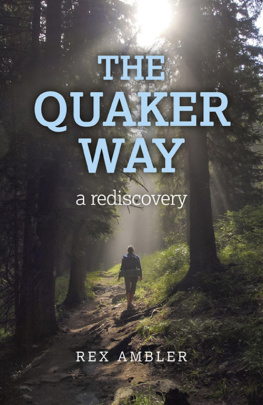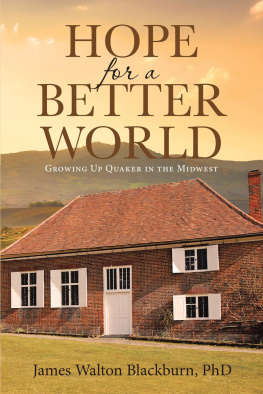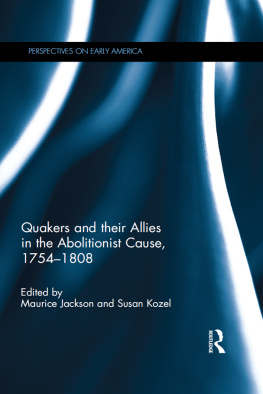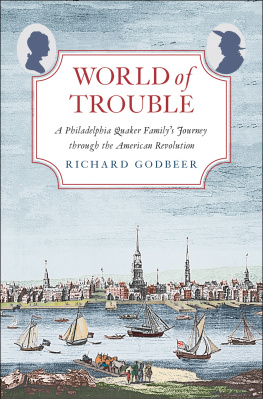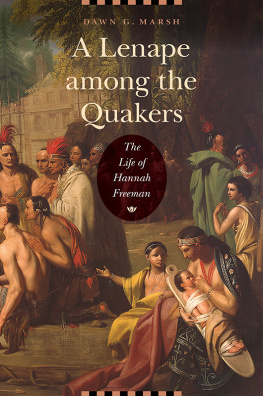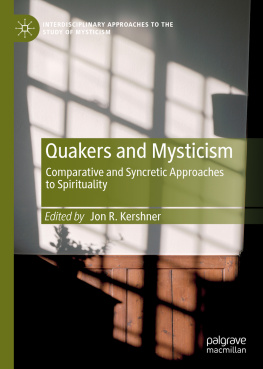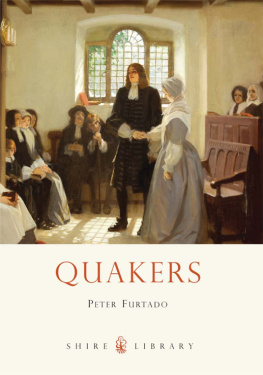
THE SPIRIT OF THE QUAKERS
THE SPIRIT OF THE
QUAKERS
SELECTED AND INTRODUCED BY
GEOFFREY DURHAM
PUBLISHED IN ASSOCIATION WITH
THE INTERNATIONAL SACRED LITERATURE TRUST
YALE UNIVERSITY PRESS
NEW HAVEN AND LONDON
Editorial matter and compilation copyright 2010 by Geoffrey Durham
All rights reserved. This book may not be reproduced in whole or in part, in any form (beyond that copying permitted by Sections 107 and 108 of the U.S, Copyright Law and except by reviewers for the public press), without written permission from the publishers.
For information about this and other Yale University Press publications please contact:
U.S. Office: sales.press@yale.edu yalebooks.com
Europe Office: sales@yaleup.co.uk www.yalebooks.co.uk
Set in Arno by IDSUK (DataConnection) Ltd
Printed in Great Britain by MPG Books, Bodmin, Cornwall
Library of Congress Cataloging-in-Publication Data
The spirit of the Quakers.
p. cm. (The sacred literature series)
Includes index.
ISBN 978-0-300-16736-8
1. Society of Friends. 2. Society of FriendsHistorySources.
I. Durham, Geoffrey.
BX7631.3.S65$2010
289.609dc22
2010029763
A catalogue record for this book is available from the British Library.
10 9 8 7 6 5 4 3 2 1

The International Sacred Literature Trust was established to promote understanding and open discussion between and within faiths and to give voice in today's world to the wisdom that speaks across time and traditions.
What resources do the sacred traditions of the world possess to respond to the great global threats of poverty, war, ecological disaster, and spiritual despair?
Our starting-point is the sacred texts with their vision of a higher truth and their deep insights into the nature of humanity and the universe we inhabit. The publishing program is planned so that each faith community articulates its own teachings with the intention of enhancing its self-understanding as well as the understanding of those of other faiths and those of no faith.
The Trust especially encourages faiths to make available texts which are needed in translation for their own communities and also texts which are little known outside a particular tradition but which have the power to inspire, console, enlighten, and transform. These sources from the past become resources for the present and future when we make inspired use of them to guide us in shaping the contemporary world.
Our religious traditions are diverse but, as with the natural environment, we are discovering the global interdependence of human hearts and minds. The Trust invites all to participate in the modern experience of interfaith encounter and exchange which marks a new phase in the quest to discover our full humanity.
To the Quaker Quest Eleven with love and thanks
CONTENTS
PREFACE
The distinguished classical accompanist Gerald Moore called his autobiography Am I Too Loud? Having completed this anthology, I rather think I know how he felt. My aim has been to guide new readers down the hidden paths of Quaker literature in a logical way, based on my own experience and a sense of what they might want to know next. My fear, however, is that I may have pointed the route too clearly. If that proves to be the case for you, I hope you will simply ignore me and dip in wherever you wish. These writers are quite capable of telling you about their lives without my help.
What I care about passionately is that people read this great writing. Quakers went through a quiet period towards the end of the twentieth century, during which they spoke a good deal to each other but thought it better to say very little to the world. They are beginning to come out of that now, but there is some catching up to do. If this book opens the door of Quakerism to just one person, I shall be happy.
Quakers will, of course, think of many other extracts that they would have chosen. I can only say that I shall almost certainly agree with them. I hope that they appreciate what they do find here, and that I may perhaps occasionally have introduced to them a little jewel they had not encountered before.
One clear omission for those new to the Quakers, inevitable in an anthology, is a full exposition of their history. I have included a brief summary of the first vital years and a chronology of essential events, but I suggest that readers who want to know more should read Portrait in Grey by John Punshon (London: Quaker Books, 2nd edition, 2006). It is an admirable account, which is both scholarly and readable.
Many people have helped as I have assembled this little collection. Malcolm Gerratt, both in his capacity as Director of the International Sacred Literature Trust and as editor and colleague, has been encouraging, thoughtful and meticulous. Richard Summers, Quaker and ISLT Trustee, has read every word and made perceptive suggestions. Val Ferguson and Mary Lou Leavitt, Quakers of great wisdom and erudition, have given me invaluable support. Wendy Tennant has deciphered my notes and typed the manuscript with skill and forbearance. I am grateful to them all.
I did much of the groundwork at Woodbrooke Quaker Study Centre in Birmingham, which is a researcher's paradise, because as well as being the friendliest of institutions it also has a superb library that never closes. Ian Jackson, its Librarian, has been unfailingly helpful. The staff of Friends' House Library in London, too, have done wonderful work in rooting out texts that I sometimes despaired of ever finding. I owe them all a great debt.
Numerous authors, copyright holders, owners of publishing rights and their representatives have generously permitted their work to be reproduced here and I would like to thank them warmly and alphabetically: Beth Allen, Robin Alpern, Rex Ambler, Brenda Bailey, Margaret Bearlin, David Boulton, Alison Burrell, Trish Carn, Dilawar Chetsingh, Joanna Clark, Mary Jo Clogg, Mary Anne Crowley, Deborah Curle, Jonathan Dale, Ben Pink Dandelion, Alec Davison, Shirley Dodson, Helen Drewery, Gilly Duff, John Dunston, George Ellis, Suzanne Finch, Simon Fisher, John Fitzgerald, Mary Fox, Diana Francis, Jonathan Fryer, David Gee, Harvey Gillman, Mark Gorman, Sarah Graham, Claire Gregory, Linley Gregory, Wright Horne, Michael Hutchinson, Peter Jarman, Ashok Jashapara, Jennifer Kavanagh, Judy Kirby, Diana Lampen, Mary Lou Leavitt, Alison Leonard, Marrianne McMullen, Tim Newell, Parker J. Palmer, Oriole Parker-Rhodes, Frank Parkinson, Judith Pembleton, Jai Penna, Andreas Priestland, John Punshon, Jim Pym, Anne Rack, Mary Rowlands, Michael Rutter, Janet Scott, William Sessions, Gil Skidmore, Martha G. Smith, Elizabeth Stevenson, Tony Stoller, Frances Taber, Katie Terrell, Helen Garay Toppins, Catherine Trippett, Eva Tucker, Katie B. Wade, Simon Watson, Rowan Whittington, Alex Wildwood.
There is a small number of copyright holders who, despite my best efforts, I am still unable to find. Any who have yet to be approached for their permission are asked to get in touch, so that omissions may be put right in future editions of this book.
Geoffrey Durham
INTRODUCTION
This book is an anthology, a selection, a pot-pourri. It is also a narrative. Readers who care to take it in order will discover, I hope, that it forms an introduction to the faith and experience of members of The Religious Society of Friends.
The extracts in this book cover the three and a half centuries that Quakers have been in existence. During their formative years they produced a huge body of written work in a short time, some of it of great importance to their future development. For that reason, I have included a good deal of material produced by the visionaries who were active between 1650 and 1700. Two hundred years later, there began another golden age of Quaker writing which covered the whole of the twentieth century. I have chosen a considerable amount of that material, too. Between those two fruitful periods, the literature is sometimes less than helpful to modern audiences, but there are notable exceptions and John Woolman, Luke Cock and Elizabeth Fry, among others, have much to offer us today. They are also represented here.
Next page
